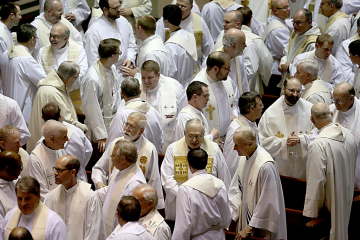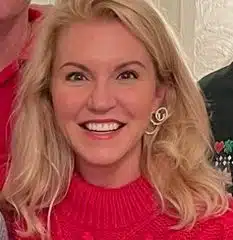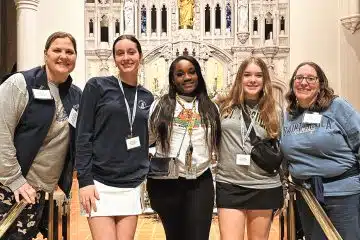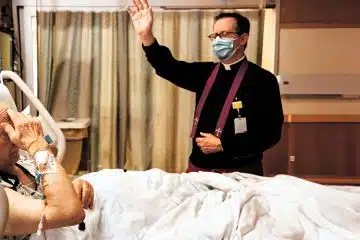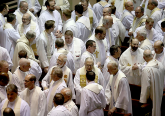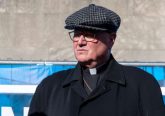Pope arrives to help promote healing in Colombia, scarred by war

IMAGE: CNS photo/Paul Haring
By David Agren
BOGOTA, Colombia (CNS) — Pope Francis arrived in Colombia Sept. 6 for a five-day visit to promote reconciliation in a deeply Catholic country scarred and reticent to offer forgiveness after decades of war.
The pope was greeted was welcomed by Colombian President Juan Manuel Santos and his wife, Maria Clemencia Rodriguez Munera. Children in traditional costumes presented him with flowers, and the pope greeted members of the Colombian military, including soldiers injured in the line of duty.
In a gesture to promote the themes of peace and reconciliation, he was given a dove by a boy named Emmanuel, who was born in a guerrilla camp to Colombian politician Clara Rojas, kidnapped in 2002 and released nearly six years later.
On the 12-hour flight from Rome, Pope Francis told reporters that the trip was “to help Colombia go forward in its journey of peace.”
Expectations for Pope Francis’ visit are running high among Colombian Catholics. It’s the first papal trip to Colombia since 1986, when St. John Paul II visited.
But he arrived after the signing of a peace accord promising to put Colombia on a path of ending more than 50 years of armed conflict. Just days before the visit, the National Liberation Army, a Marxist organization carrying out crimes like kidnap and bombings, and the government agreed to a four-month cease-fire.
Challenges remain, especially as many Colombians — including Catholics and those of conservative persuasions — object to the idea of demobilized Marxist guerrillas accused of atrocities receiving reduced punishments and even participating in politics. Those persecuted by paramilitaries voice similar misgivings.
“We are expecting that the pope brings a lot of hope,” said Msgr. Hector Fabio Henao, director of Caritas Colombia. “The pope arrives at a time when reconciliation is the greatest challenge. We hope that his message touches the hearts of those who have suffered due to this conflict.”
The papal trip carries the motto: “Let’s take the first step,” purposely chosen to convey a sense of collective involvement in the country’s peace process.
“The motto of the apostolic trip says exactly what we are expecting: Let’s take the first step,” said Auxiliary Bishop Juan Carlos Cardenas Toro of Cali. “This first step by the pope, stepping off the flight to come closer to this nation, which has suffered, is something for us that opens the door to hope.”
The Colombian government and Revolutionary Armed Forces of Colombia, known by its Spanish acronym as FARC, reached a peace accord in 2016, in which the FARC agreed to demobilize. The agreement has proved polemic, even though violence perpetrated by guerrilla groups, government soldiers and paramilitaries has left an estimated 220,000 dead and millions more displaced.
Catholics are divided on the peace accord, and Colombian bishops have stayed on the sidelines, while encouraging the laity to voice their opinions. Many conservative Catholics, along with evangelicals, argued the deal included provisions harmful to the traditional family — a charge denied by peace accord proponents; opponents turned out to defeat the deal in a plebiscite.
The accord later was reworked and approved in Congress. People say they want peace, but disagree — often strongly — on how to pursue it
“The church itself reflects the divisions in Colombian society,” said Jesuit Father Mauricio Garcia Duran. “The pope comes to Colombia in a context of polarization.”
The papal visit touches on themes important to the country and church. In the capital, Bogota, Sept. 7, the pope will celebrate a Mass focused on young people, expected to attract more than 1 million attendees.
He travels Sept. 8 to Villavicencio — gateway to the at-times neglected southern half of Colombia — where he will pray with 6,000 victims of violence and is expected to call for reconciliation. That call for reconciliation will include a call to reconcile with creation; included in the audience will be indigenous peoples from the Amazon and lands increasingly exploited by mining and natural resource extraction.
The following day, Pope Francis will address clergy and religious in the city of Medellin. He also will visit a Catholic orphanage.
Pope Francis ends his visit to Colombia on the Caribbean coast in the city of Cartagena. There he is expected to address the church’s controversial history of trafficking slaves to the New World.
He will also recite the Angelus at a shrine to St. Peter Claver, a Jesuit who worked to stop slavery.
– – –
Contributing to this story was Cindy Wooden in Bogota.
– – –
Copyright © 2017 Catholic News Service/U.S. Conference of Catholic Bishops. www.catholicnews.com. All rights reserved. Republishing or redistributing of CNS content, including by framing or similar means without prior permission, is prohibited. You may link to stories on our public site. This copy is for your personal, non-commercial use only. To request permission for republishing or redistributing of CNS content, please contact permissions at [email protected].




